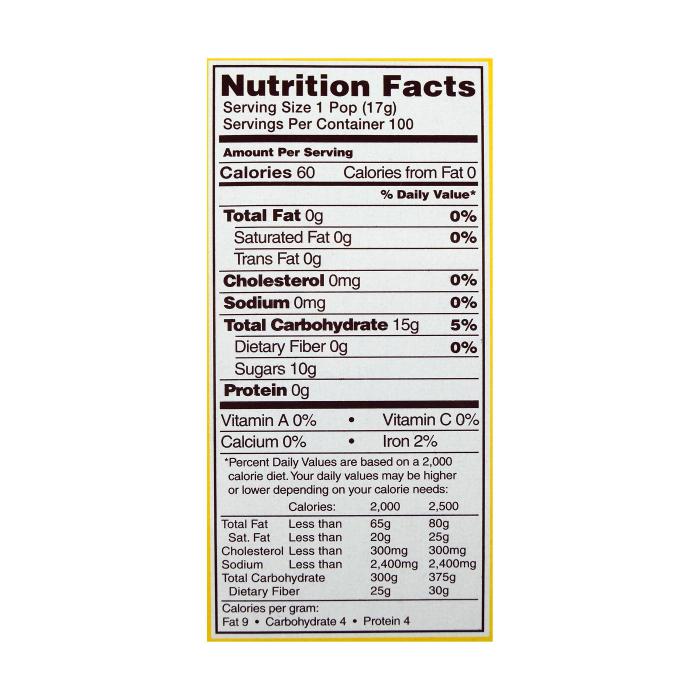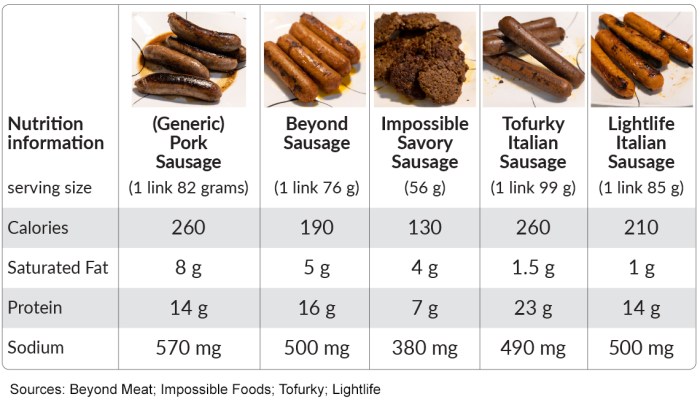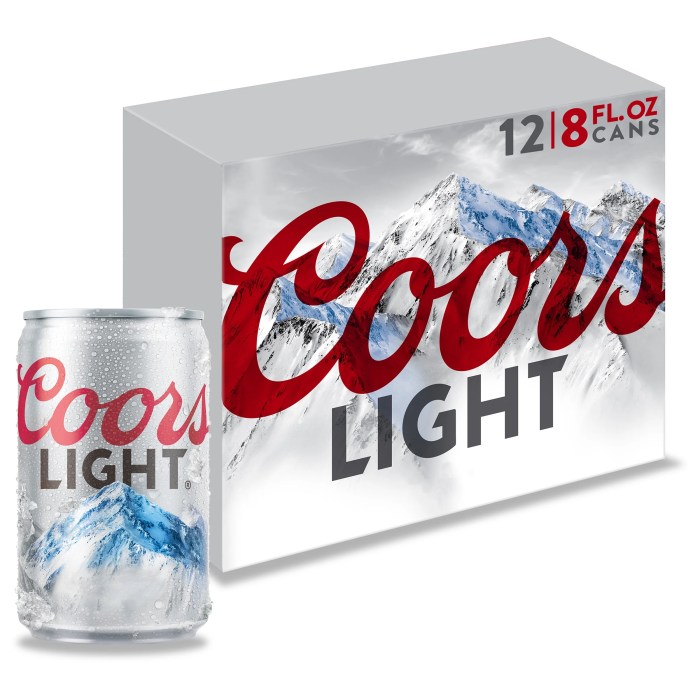Monster Energy Drink Caffeine Content: Monster Nutrition Facts Caffeine
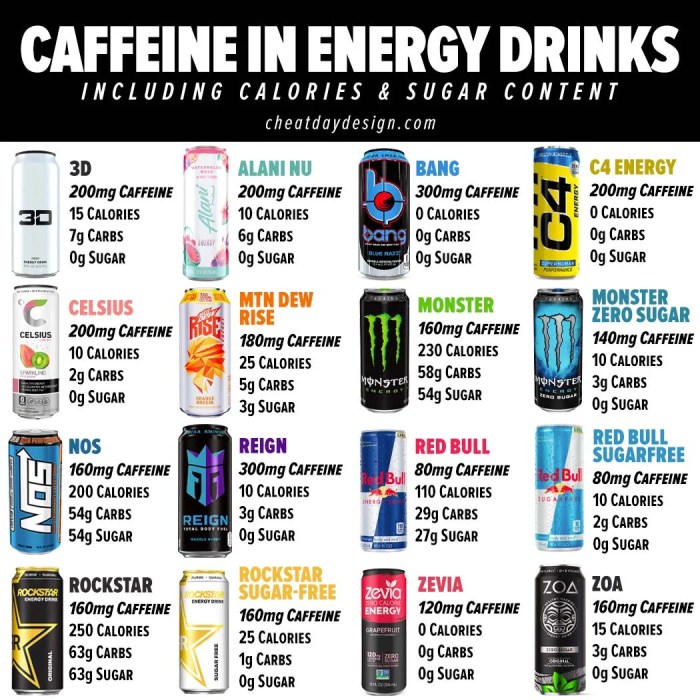
Monster nutrition facts caffeine – Monster Energy drinks are widely popular, but their high caffeine content is a significant factor to consider. Understanding the specific caffeine levels in different varieties and comparing them to other beverages helps consumers make informed choices about their intake. This section will provide a detailed breakdown of Monster Energy drink caffeine content, comparing it to other popular beverages and discussing the potential health effects.
Caffeine Levels in Monster Energy Drinks
The caffeine content in Monster Energy drinks varies depending on the specific flavor and serving size. Precise figures can fluctuate slightly depending on the batch and manufacturing process, but the following table provides a general overview based on typical product information. Note that these values are approximations and should not be considered absolute.
| Flavor | Caffeine mg per serving | Serving Size (ml) | Caffeine mg per 100ml |
|---|---|---|---|
| Original Monster Energy | 160 | 473 | 33.8 |
| Monster Rehab | 100-140 (varies by flavor) | 473 | 21.1 – 29.6 |
| Ultra Paradise | 0 | 473 | 0 |
| Java Monster | 150-180 (varies by flavor) | 473 | 31.7 – 38.1 |
| Mango Loco | 160 | 473 | 33.8 |
Comparison to Other Caffeinated Beverages
It’s important to contextualize Monster Energy’s caffeine content by comparing it to other commonly consumed caffeinated beverages.
Understanding the caffeine content in Monster energy drinks is crucial for those watching their intake. For a contrasting perspective on fast-food nutrition, you might check the nutritional breakdown of a McChicken 5 dollar meal available here: mcchicken 5 dollar meal nutrition facts. Comparing this to Monster’s caffeine content highlights the significant differences in sugar and calorie density between these options, ultimately influencing one’s daily energy and nutritional balance.
The following bullet points offer a comparison:
- A typical cup of brewed coffee (8 oz): Contains approximately 80-100mg of caffeine.
- A can of Coca-Cola (12 oz): Contains approximately 34mg of caffeine.
- A can of Red Bull (8.4 oz): Contains approximately 80mg of caffeine.
- Many other energy drinks: Caffeine content varies greatly among brands and specific products, but often falls within a similar range to Monster Energy.
Potential Health Effects of Monster Energy Drink Caffeine
The high caffeine content in Monster Energy drinks can have both positive and negative effects on health.
Potential positive effects, although often subtle and dependent on individual factors, may include:
- Increased alertness and focus.
- Improved physical performance in some individuals during short bursts of activity.
- Potential mood boost (although this can be followed by a crash).
However, the negative health impacts associated with high caffeine consumption are more widely documented and can be significant:
- Anxiety and jitters: High doses of caffeine can trigger feelings of anxiety, nervousness, and restlessness.
- Insomnia: Caffeine consumption close to bedtime can interfere with sleep patterns.
- Heart palpitations and increased heart rate: Excessive caffeine intake can lead to an irregular heartbeat and elevated blood pressure.
- Digestive issues: Caffeine can stimulate bowel movements and cause stomach upset in some individuals.
- Headaches: Both caffeine withdrawal and excessive consumption can trigger headaches.
- Dehydration: Caffeine has a mild diuretic effect, potentially leading to dehydration if fluid intake isn’t sufficient.
Monster Energy Drink Consumption and Health Implications
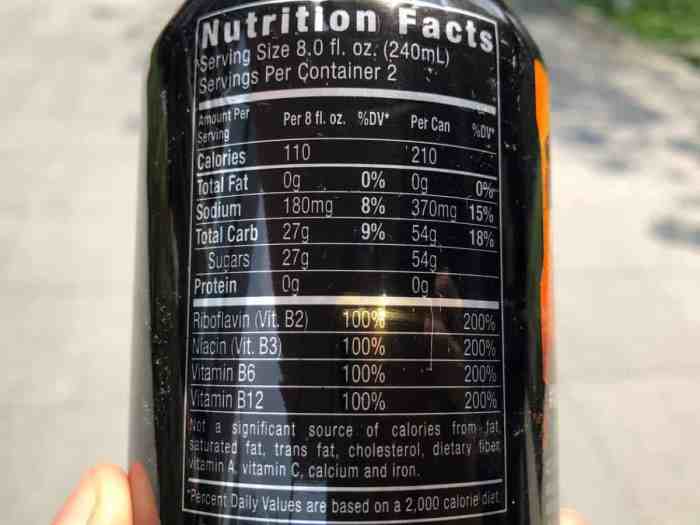
Regular consumption of Monster Energy drinks, due to their high caffeine and sugar content, can significantly impact various aspects of health, both in the short-term and long-term. Understanding these effects is crucial for making informed decisions about beverage choices. The following sections detail these potential impacts across different demographics.
Short-Term Effects of Monster Energy Drink Consumption
The immediate effects of consuming a Monster Energy drink often involve a surge in energy levels, stemming primarily from the high caffeine content. This can lead to increased alertness and improved focus, but it can also result in nervousness, anxiety, and even jitters. The high sugar content contributes to a rapid spike in blood sugar, followed by a subsequent crash, leading to fatigue and irritability.
Other short-term effects can include insomnia, especially if consumed close to bedtime, and gastrointestinal upset, such as nausea or diarrhea, due to the acidity and other ingredients. These effects are generally more pronounced in individuals who are not regular caffeine consumers or those sensitive to caffeine.
Long-Term Effects of Monster Energy Drink Consumption
Chronic consumption of Monster Energy drinks poses more serious health risks. The high caffeine intake can lead to dependence, requiring progressively higher amounts to achieve the same stimulating effect. This can disrupt sleep patterns, leading to chronic sleep deprivation, which is linked to various health problems including weakened immunity, weight gain, and increased risk of chronic diseases. The consistent high sugar intake contributes to weight gain, increasing the risk of type 2 diabetes, heart disease, and other metabolic disorders.
Furthermore, the high caffeine levels can negatively impact cardiovascular health, potentially raising blood pressure and heart rate, increasing the risk of arrhythmias in susceptible individuals. Long-term mental health impacts may include increased anxiety and depression, though more research is needed to definitively establish causal links.
Comparative Effects Across Demographics, Monster nutrition facts caffeine
The effects of Monster Energy drink consumption vary across different demographics. Adolescents, whose bodies are still developing, are particularly vulnerable to the negative consequences of high caffeine and sugar intake. Their developing nervous systems are more sensitive to stimulants, and the impact on growth and development is not yet fully understood. Adults generally exhibit more tolerance to caffeine, but excessive consumption can still lead to many of the aforementioned negative health effects.
Pregnant and breastfeeding women should particularly avoid excessive consumption, due to the potential impact on the developing fetus or infant.
| Demographic | Short-Term Effects | Long-Term Effects |
|---|---|---|
| Adolescents | Increased anxiety, jitters, sleep disturbances, gastrointestinal issues | Increased risk of cardiovascular problems, impaired growth and development, addiction, sleep disorders, weight gain, and metabolic issues. |
| Adults | Increased energy, anxiety, sleep disturbances, gastrointestinal issues | Increased risk of cardiovascular problems, addiction, sleep disorders, weight gain, and metabolic issues. |
| Pregnant/Breastfeeding Women | Increased anxiety, heart palpitations, sleep disturbances | Potential negative impact on fetal development, caffeine transfer through breast milk. |
Illustrative Representation of Energy Level Impact
Imagine a graph showing energy levels throughout a typical day. For someone who doesn’t consume Monster, the energy levels would show a gradual increase in the morning, a peak during the day, and a gradual decline towards evening. Now, imagine the same graph for someone who consumes a Monster Energy drink mid-morning. Their energy levels would show a dramatic spike immediately after consumption, a period of heightened energy, followed by a sharp and significant drop, resulting in a significant energy deficit later in the day, potentially leading to fatigue and decreased productivity.
This crash is far more pronounced and longer lasting than the natural energy decline.
FAQ
What are the long-term effects of consuming Monster Energy drinks regularly?
Long-term, high consumption may lead to issues like sleep disturbances, cardiovascular problems, and increased anxiety or jitters. It’s important to consume in moderation.
Are there any interactions between Monster Energy drink ingredients and medications?
Yes, some ingredients in Monster could interact negatively with certain medications. Consult your doctor if you have concerns, especially if you take medication for heart conditions or anxiety.
Is Monster Energy suitable for adolescents?
Due to the high caffeine and sugar content, Monster Energy is generally not recommended for adolescents. Their bodies are still developing and are more susceptible to negative effects.
Can I drink Monster Energy daily?
Daily consumption is not advised due to the high caffeine and sugar content. Limiting intake is crucial to avoid potential negative health consequences.
What are some healthier alternatives to Monster Energy?
Consider alternatives like infused water, green tea, or naturally sweetened fruit juices for a healthier energy boost.

